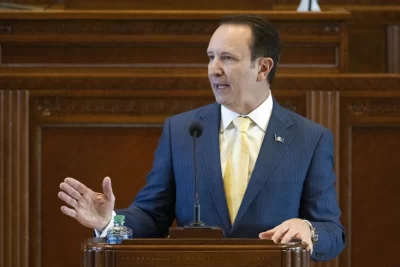
The week of Presidents’ Day 2024 comes at a lull before contentious budget battles resume in early March. It is thus an opportune moment to check in on limited government.
In short: Our federal custodial state is a problem. This is not solely due to increasingly unsustainable intergenerational debt. The interconnectedness of hyper-spending with regulations influences nearly all aspects of economic and social life in ways the Framers surely never envisioned.
The Congressional Budget Office’s just-released 2024 Budget and Economic Outlook reads more like a Halloween horror story than a sober and patriotic reflection on the achievements of a limited constitutional republic worthy of George Washington and his birthday.
The CBO revealed that discretionary, entitlement and interest spending reached $6.135 trillion in fiscal year 2023. Given revenues of “only” $4.439 trillion, the 2023 federal deficit stood at $1.695 trillion. Deficits alone exceed outlays of the mid-90s.
Current projections envision spending topping $7 trillion in 2027, and over $10 trillion in 2034. Deficits will surpass $2 trillion by 2031 and remain above that level.
Even as Biden prepares to unveil his own FY 2025 budget proposal in the second week of March, we confront another budget deadline for still-unresolved fiscal year 2024 spending. The $34 trillion national debt looms above all.
True, numerous proposals for a Balanced Budget Amendment are to be found in the 118th Congress. But the most we appear to be getting is tentative talk about a bipartisan debt reduction commission to formulate recommendations on spending rollbacks.
We have to be careful in the transition about what we regard as success in bringing the budget toward balance. Balancing the budget at anything close to today’s stratospheric heights means permanent over-spending and over-regulation.
Serious proposals should embrace the limited government heritage for which we honor past presidents, and reject today’s Leviathan. Congress ought to ask of every action how it is “necessary and proper” to carry out its handful of limited, enumerated tasks.
Speaking of presidents and budgets, the opponents of mandatory balanced budgets occasionally rejoice in proclaiming that even Thomas Jefferson supported government borrowing, given his decision on the Louisiana Purchase.
It is an interesting story, but not one that can rationalize big government and chronic debt. Jefferson certainly did articulate in a 1798 letter to John Taylor a preference for a prohibition on federal borrowing:
Today’s spenders point to Jefferson’s alleged subsequent about-face, his borrowing to finance the Louisiana Purchase during his presidency (1801-1809). In his 1803 State of the Union address, Jefferson acknowledged added public debt, declaring:
Note Jefferson’s promises that existing debts be retired via sinking fund, a mechanism he had favored earlier (for example in a 1785 letter to Count Van Hagendorf) with respect to Revolutionary War debts:
It turns out that, not only were “existing debts…discharged,” but substantial surpluses were obtained during each year of Jefferson’s presidency. Here are federal surpluses as a percent of outlays 1801-1808 (from (according to Gary M. Anderson, “The US Federal Deficit and National Debt: A Political and Economic History”):
YEAR % Outlays
1801 37.69%
1802 90.74
1803 40.90
1804 35.63
1805 29.06
1806 58.71
1807 96.28
1808 71.76
While Jefferson abandoned the no-borrowing principle, he retained a conviction that the government pay as it goes for the few things it does. This was a particularly impressive accomplishment for what was a young government, relatively “unsettled” and “unorganized,” as Anderson pointed out. Revenues sprang from tariffs, excise taxes and land sales—not today’s income tax.
A chasm opens between reasoned borrowing and the chronic deficits of today. As budget battles resume, policymakers must in the first instance avoid starting new spending programs of the very sort that have created our current dilemma. Both parties share the cravings for redistribution and intervention, for big spending and regulation—exemplified in the fact that the last surplus of modern times was in 2001.
The Jefferson story is always one worth occasionally revisiting. Big things can happen without big chronic borrowing. Presidents’ Day should be a constant reminder that lean government and leadership not impelled to perpetually overspend and over-regulate allow the nation to flourish.







